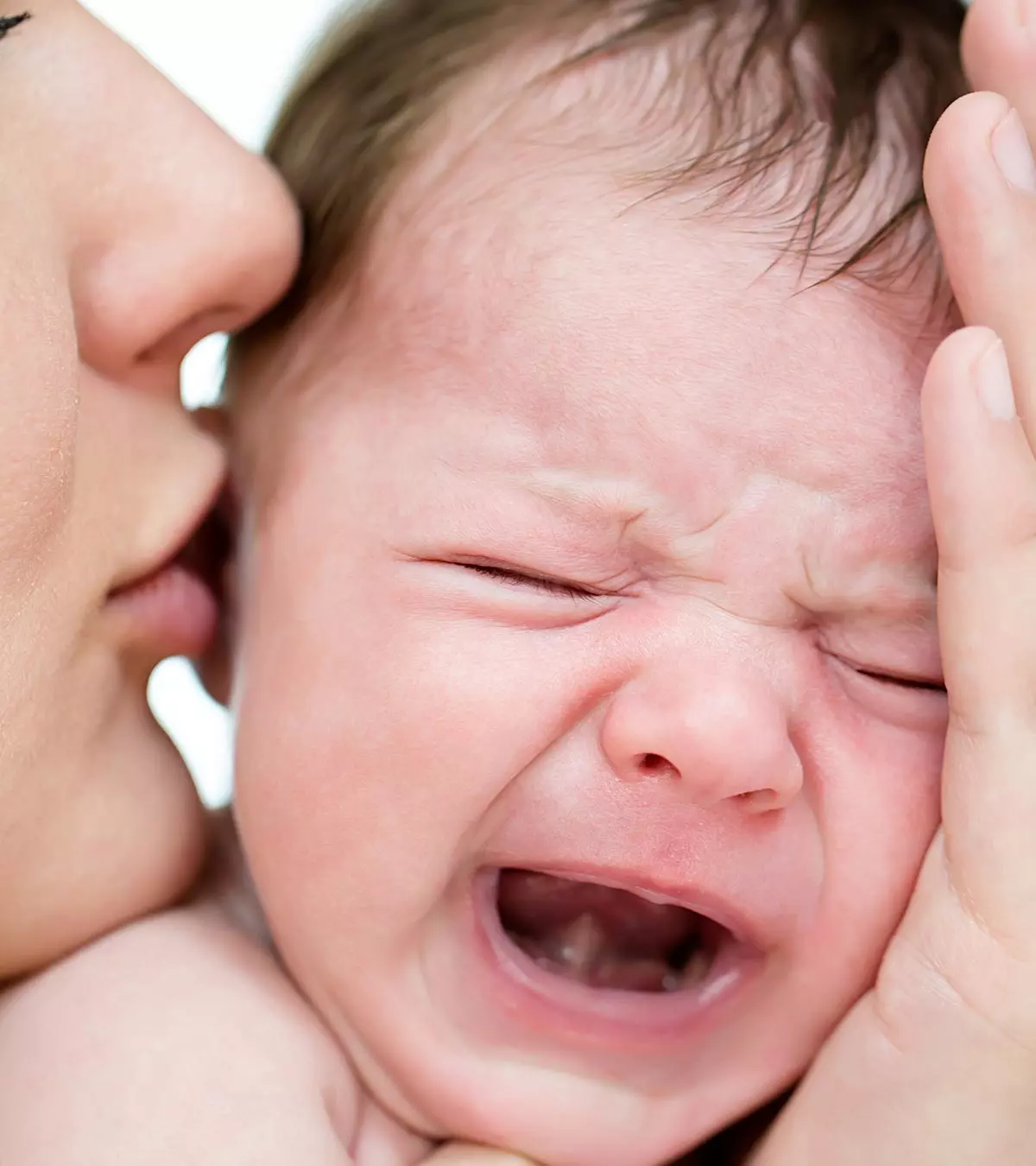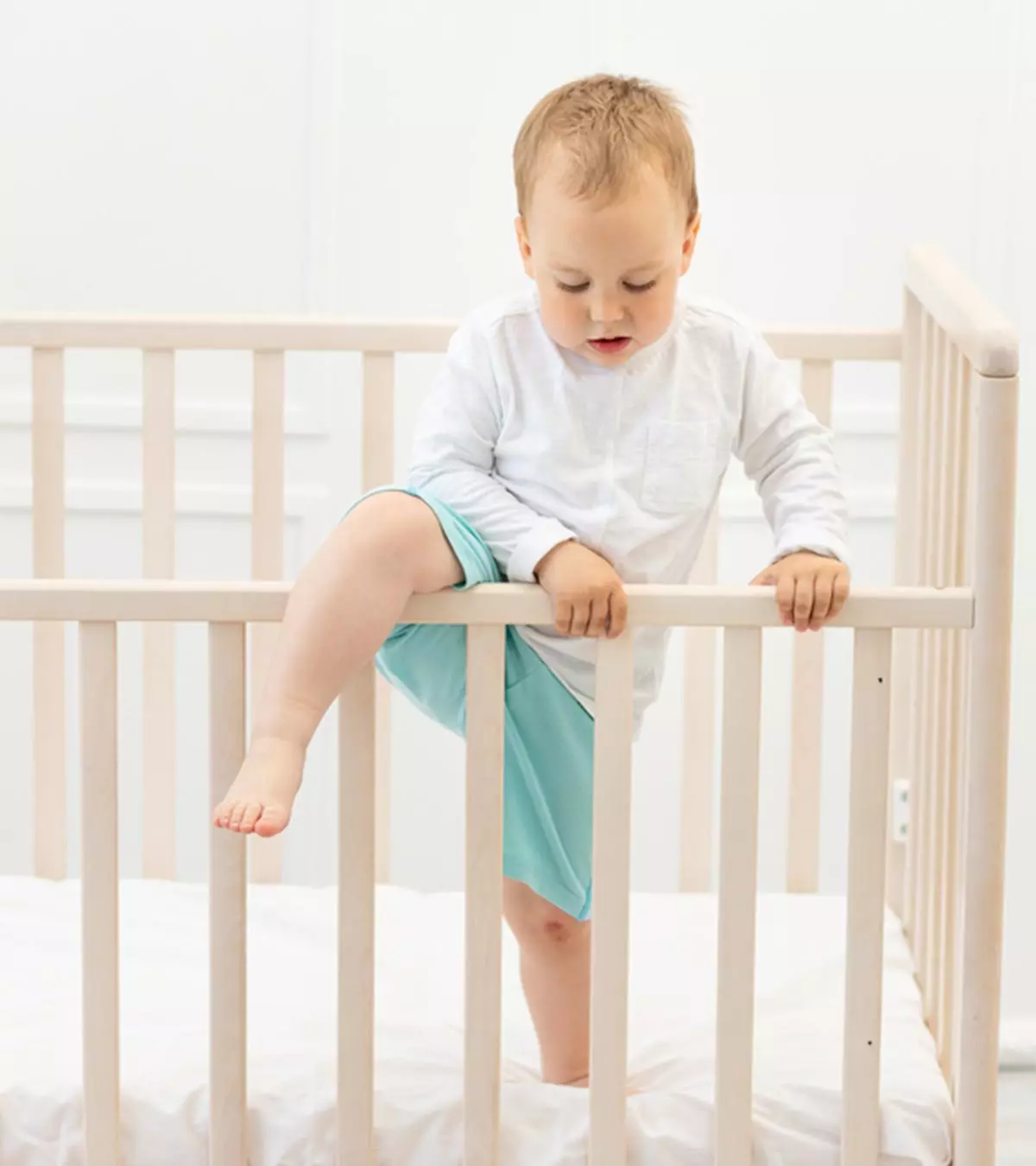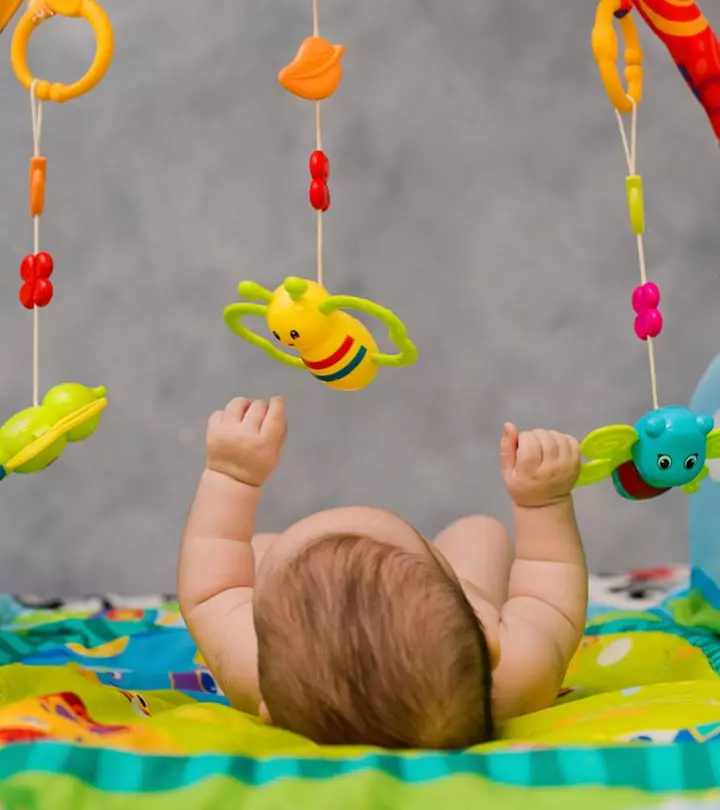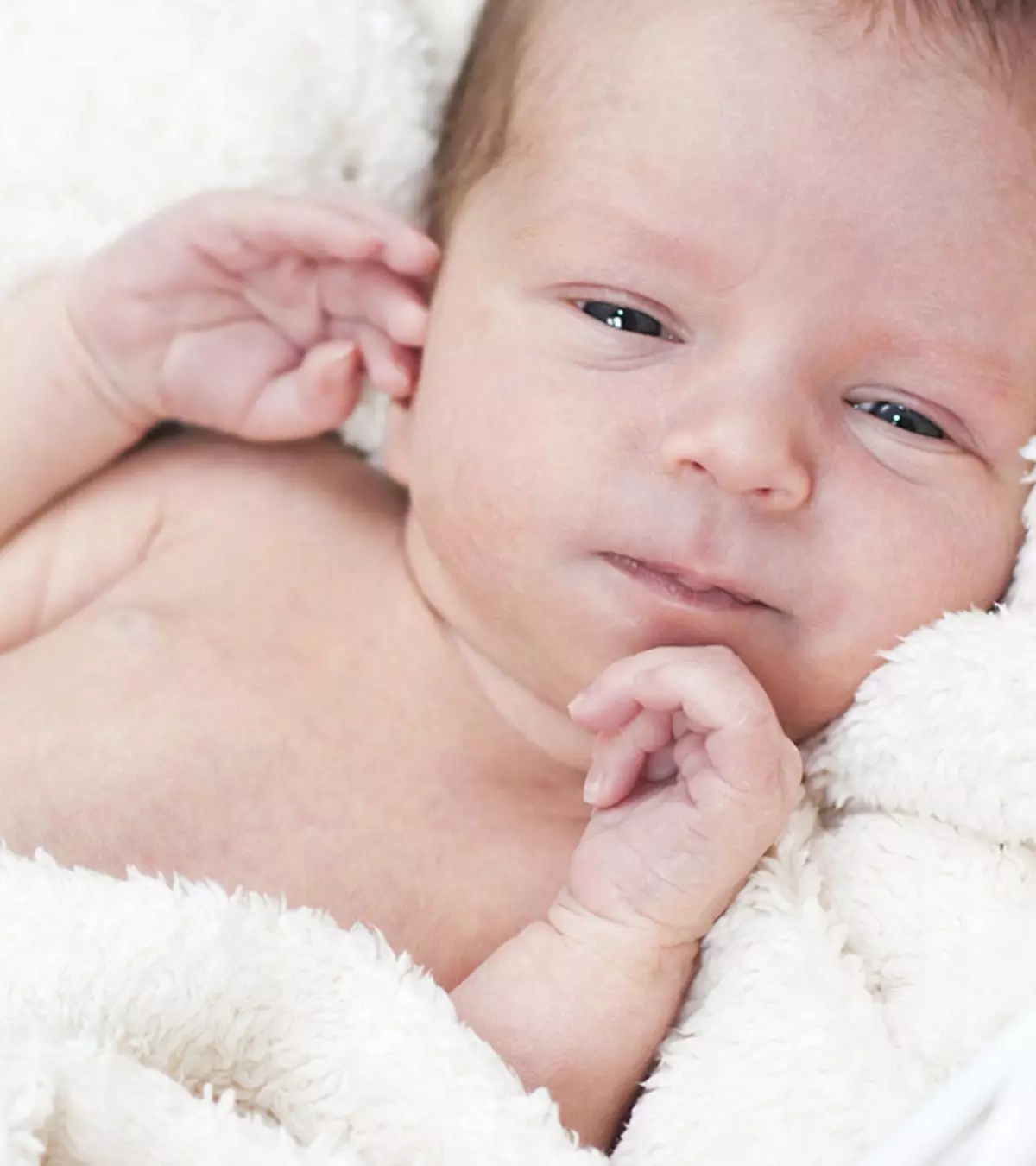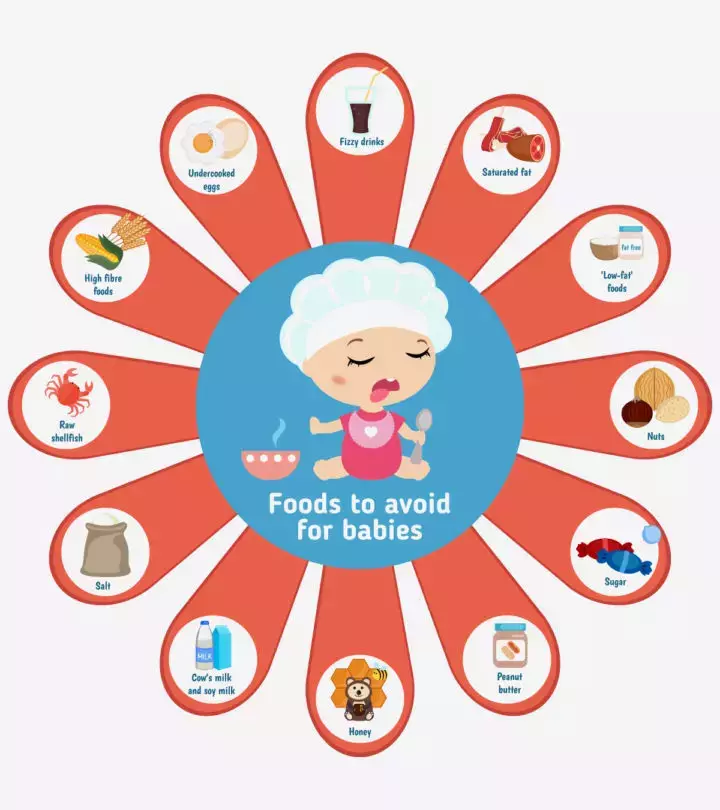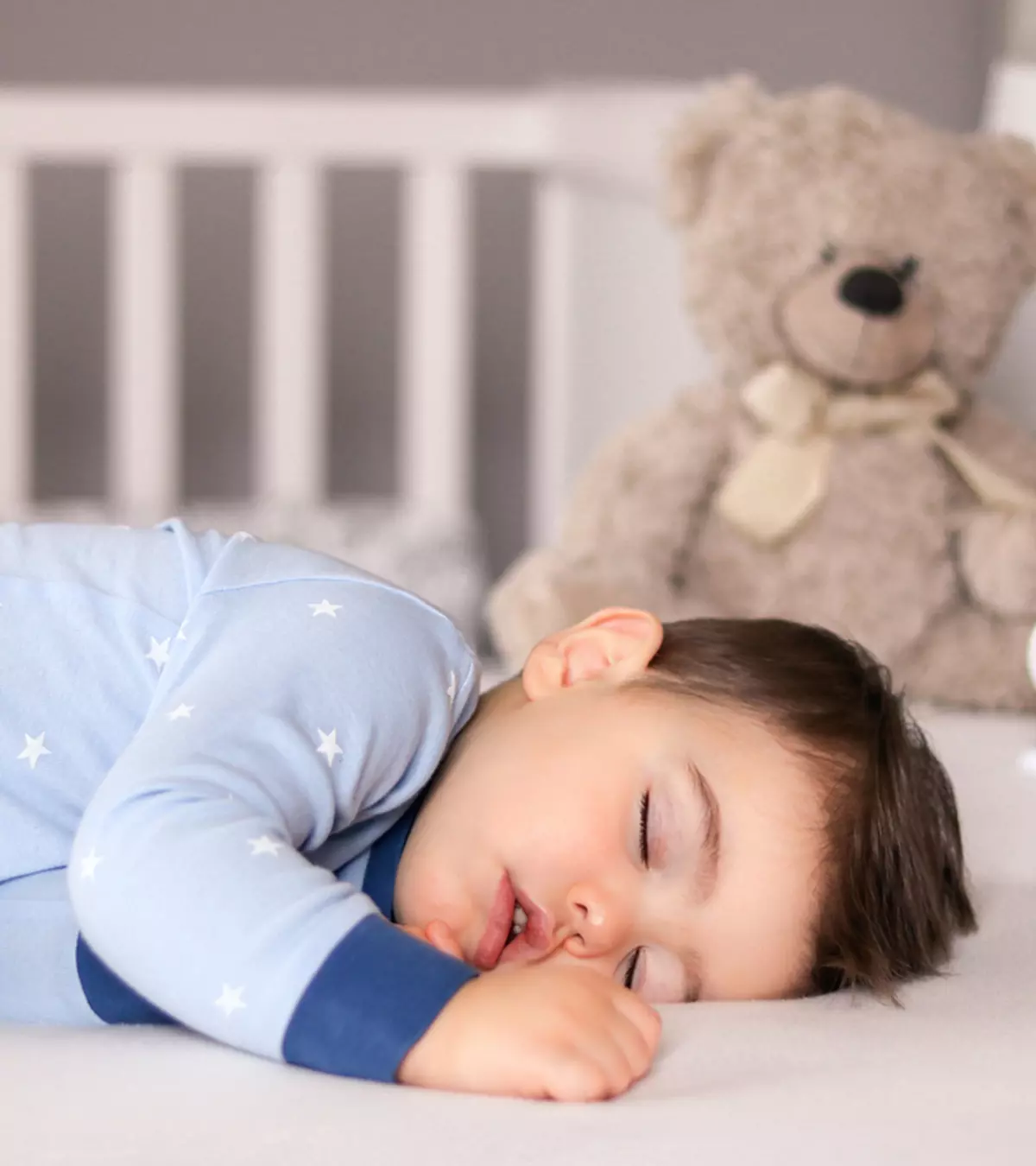
Image: ShutterStock
Many parents deal with restless sleep in babies and are curious to find a solution. However, sleep patterns vary from one child to another. Some babies wake up briefly during the night and go back to sleep, while others wake up frequently and cannot soothe themselves to sleep again. If babies have disrupted dozing, it may be due to several factors. For example, they may not have started identifying the difference between day and night, need to feel more secure, are hungry, or have not developed a sleep routine. Therefore, to help babies sleep properly, parents need to be patient and observant of their needs. Read this post to learn some effective tips to ensure restless babies calm down and sleep peacefully.
Key Pointers
- Babies may be restless sleepers for several reasons, such as needing security, needing a diaper change, or hunger.
- Parents can look for sleeping cues in babies, such as rubbing eyes or pulling ears, and create a proper environment for sleeping.
- Setting a peaceful schedule for the baby during the day and a fixed sleep routine at night may help deal with the situation.
- Singing lullabies and using white noise for the baby may help them fall asleep quickly and easily.
- Nevertheless, it is crucial to consult a pediatrician if the baby’s restlessness seems never-ending.
Sleep Development In Babies
The sleep patterns of babies tend to change as they grow. Newborns, for instance, do not have a clear distinction between day and night. They may get short bursts of sleep with intermittent waking periods for diaper changes and feedings. As they turn a month old, they tend to sleep longer between intervals and recognize the difference between light and dark.
By around three months, babies tend to have a deeper night’s sleep, and by six months, they tend to sleep for up to eight hours at night. By around 12 months, babies tend to have shorter daytime naps that amount to less than two to four hours and enjoy up to 12 hours of night sleep. They also have their own fixed sleep patterns at night and tend to be more active during the day. However, some may begin having dreams and nightmares, which could interfere with their sleep (1).
 Quick fact
Quick factCauses Of Restless Sleep In Babies
Sleep interruptions are common in newborns and infants, and various factors can contribute to their restless sleep. Here are some common causes (1) (2):
- Hunger: Babies may have trouble falling asleep if they’re hungry. Hunger can cause discomfort, making it difficult for them to relax. Babies, especially in their first few months, need frequent feeding, even at night. If they haven’t had enough to eat, they may wake up frequently or have trouble sleeping.
- Uncomfortable clothing: Overdressing or underdressing can cause discomfort, leading to sleep issues. While overdressing can cause overheating, underdressing can make them too cold, leading to restlessness and disturbed sleep.
- Need for diaper change: Babies frequently wet and soil their diapers in the early months. Checking and changing their diapers when needed can help ensure they sleep soundly.
- Developmental phases: Babies may experience sleep disturbances during growth spurts or developmental milestones. During growth spurts, they may feel hungrier or more restless, affecting their usual sleep patterns.
- Separation anxiety: Around 6-12 months, many babies develop a strong attachment with their parents or caregivers. It may cause them to feel anxious or restless when the parent/caregiver is not around, for instance, at bedtime. While this attachment is normal, it can cause the babies to have sleeping troubles.
- Boredom: When babies are overstimulated or not engaged enough, especially during the day time, they might have difficulty winding down for sleep. Try reading, singing, or swaddling them to help comfort them.
- Illnesses: Sleep disruptions are common if a baby is unwell. Conditions such as colic, infections, vomiting, or fever can cause discomfort, disrupting the baby’s usual sleep cycle.
If you’re unsure about your baby’s sleep issues or need assistance with their sleep patterns, consult a pediatrician for guidance.
7 Effective Tips To Make Your Restless Baby Sleep
Most moms are worried that their baby might lack good sleep. Don’t forget that sleep comes naturally to babies, once their tummies are full! Thus, the key to good sleep is a well-fed baby. A newborn baby needs to be fed at regular intervals, to ensure proper growth and development. If you want to know how to help a restless baby sleep, try the ideas listed below (2) (3) :
1. Understand your baby’s cues

Your baby cannot tell you that he or she is sleepy, but can definitely convey some clear signs of sleepiness.
- Rubbing their eyes, pulling ears, or having puffy eyes are some signs that the baby is feeling sleepy. It is the perfect time to put them to bed.
- When you delay your baby’s sleep time, they will become all the more restless and may not be able to sleep then.
- Try taking notes to understand your baby’s sleep cues better, when the baby falls asleep, and how long the baby sleeps.
 Point to consider
Point to consider2. Let the surroundings speak
Babies do not completely understand the difference between day and night, since they are usually inside the house.
- Subtly teach him the difference by taking your newborn baby outside for a few minutes in the daylight, possibly in a bright corner of your terrace or foyer.
- Always try to create a sleepy atmosphere at night. Reduce the external noise, dim the lights, and put them in bed to make them realize that playtime is over.
Madeleine, a mother and blogger, believes that getting your baby accustomed to their sleep environment early on can help improve their sleep routine. She says, “The one thing I would HIGHLY suggest starting the week you bring home baby is get them used to their room and crib. Read stories, rock, nurse, change diapers in their room. The more baby is familiar with their room and surroundings, the easier the transition will be. The second week home, we had baby girl napping in her crib during the day whenever we could (i).”
3. Avoid sudden change in routine
You might realize that a slight change in their surroundings makes your baby have a restless night.
- Babies like to be present in a familiar environment along with familiar people.
- So always try to have your child sleep in the same room, on the same bed or cot.
- If your baby is ready to transition into a crib, make sure to choose the right time and stay patient and consistent with their sleep routine.
 Experts say
Experts say4. Understand the reasons for waking up

You might get annoyed by your baby’s night wakings and crying. There are reasons behind this act, which you need to understand.
- Sometimes, they might have a wet diaper or even be hungry. Make a note of such disturbance and likewise make necessary changes in their diet.
- Make sure your baby is well-fed before sleep time. Also, ensure that the diaper they are wearing at night is good enough to last the entire night.
 Point to consider
Point to consider5. Create a sleep routine
Just like when you bring the baby’s feeding bottle, they understand that it is time to eat. Similarly, you need to create sleep associations.
- Make a routine of giving a warm bath to your baby before sleep time.
- If you sing a lullaby, then do it every day or record your piece of music and play it before sleep. Such a routine will make your baby fall asleep more easily.
 Quick tip
Quick tip6. Create a peaceful atmosphere
If your baby is fussy and restless during the day, they are likely to be the same during nights. However, you can make a difference by creating a calm daytime environment.
- Keep the home atmosphere tranquil and spend more time with the baby to make their day easygoing.
- If your baby had a restless night, their days could be challenging. So, it is not unusual to notice a fussy, cranky, overtired baby the next day.
- To create an ideal room environment for sleep, maintain a comfortable room temperature. Consider using white noise for a while and dimming the lights to create a dark, cozy atmosphere (4).
Dr. Jennifer Shu from the American Academy of Pediatrics (AAP) shares tips on helping babies sleep comfortably. She says, “Parents often ask, ‘How can I get my baby to sleep?’ I recommend putting your baby to bed when they are drowsy but still awake so they learn to fall asleep on their own. Place them on their back in their crib and keep the crib free of any items to ensure nothing interferes with their breathing (ii).”
7. Take your partner’s support

It is difficult to manage your baby single-handedly during the day as well as at night. It is a responsibility which you and your partner should share equally.
- Typically, the mother or the nanny is the primary caregiver during the day. Ideally, you should get your partner to share responsibilities during night time.
- When both parents are working, it is best to have an early discussion and delegate childcare responsibilities by mutual understanding.
Frequently Asked Questions
1. Which syrup is best for restless baby sleep?
It is suggested that you must refrain from using any sleep medication to deal with your baby’s sleep issues. Moreover, if you feel your baby could be suffering from a medical problem such as reflux, you should contact a pediatrician to understand appropriate treatment interventions (1).
2. How should I massage my restless baby to sleep?
Try gently massaging your baby’s legs and back; it could help relieve gas and soothe them. You may also try playing soft music while giving them a massage (2).
3. Do babies like sleeping in the dark?
Babies cannot differentiate between day and night until around two months (3). However, it is recommended that you put your baby to sleep in a dark, calm, and comfortable environment (1).
4. Are babies normally restless at night?
It is normal for babies to stay restless at night, especially during the first few months of life. Newborns and young babies are restless sleepers. They wake up often for feeding, diaper changes, or discomfort (4). Additionally, infants have shorter sleep cycles than adults.
5. What is the difference between restless sleep and sleep regressions?
Restless sleep is defined as random periods of discomfort or waking during sleep, often triggered by short-term factors like hunger or teething. On the other hand, sleep regressions are longer-term changes in sleep patterns associated with developmental milestones or growth spurts. While restless sleep can occur intermittently, sleep regressions often continue for a few weeks, resulting in increased night waking and fussiness in a previously good sleeper (4) (5).
Restless sleep in babies could be due to several underlying factors. Therefore, to prompt a good sleeping routine in your baby, you must be able to identify why your baby fights sleep. Then, take the necessary steps based on the cause. Check if your baby is feeling full by the time they go to bed. Alternatively, try to create a soothing sleep environment and abide by a sleeping schedule for your baby. You could also allow the baby to self-soothe. If their tossing and turning still worries you, consult your child’s pediatrician.
Infographic: How To Help Your Baby Sleep Well?
Babies start sleeping throughout the night at around six months of age. Before that, and sometimes even past that age, babies frequently wake up at night or have a restless sleep. Changes in environment, developmental milestones, or illness often contribute to it. The infographic below suggests tips to help your baby sleep well.

Illustration: Momjunction Design Team
Illustration: How To Deal With Restless Sleep In Babies? 7 Essential Tips
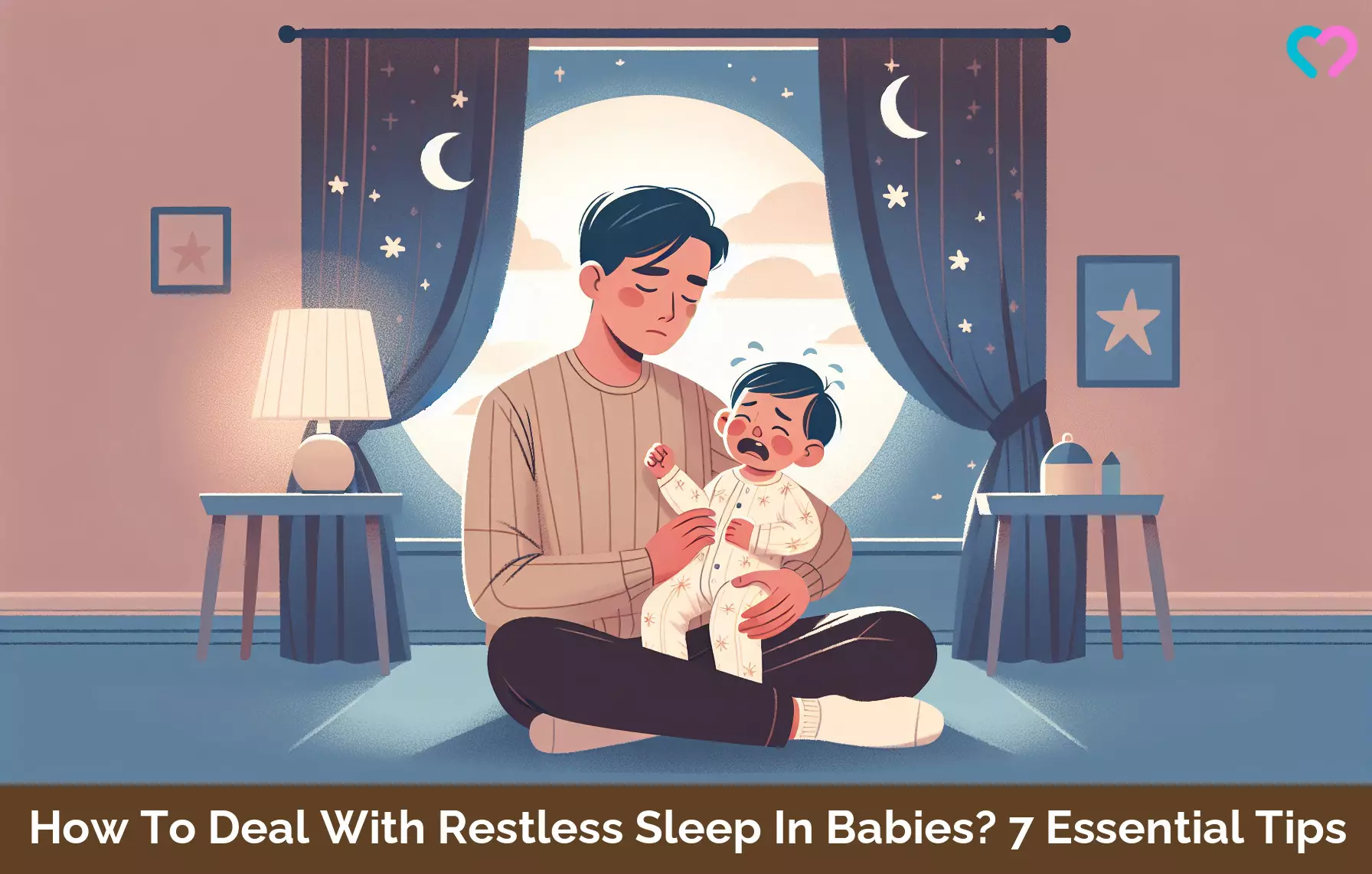
Image: Dall·E/MomJunction Design Team
Learn all about baby sleep in this informative video! Get tips on how to help your baby get the proper sleep they need for their proper growth and development.
Personal Experience: Source
MomJunction articles include first-hand experiences to provide you with better insights through real-life narratives. Here are the sources of personal accounts referenced in this article.
i. Moving Baby to Crib…You Can Do It!;
https://newmumontheblog.wordpress.com/2012/10/16/moving-baby-to-crib-you-can-do-it/
ii. Dr. Jennifer Shu with the American Academy of Pediatrics offers tips on getting baby to go to sleep;
https://www.youtube.com/watch?v=F2g-Sb_lVaU
References
- Baby sleep patterns by age.
https://www.pregnancybirthbaby.org.au/sleep-patterns-for-babies - Fussy Babies.
https://www.mottchildren.org/posts/your-child/fussy-babies - Sleep in Infants (2-12 Months).
https://www.nationwidechildrens.org/specialties/sleep-disorder-center/sleep-in-infants - Your baby’s sleep patterns.
https://www.tommys.org/pregnancy-information/after-birth/your-babys-sleep-patterns - Typical sleep behaviour (4) – toddlers 1 to 2 years.
https://www.betterhealth.vic.gov.au/health/healthyliving/typical-sleep-behaviour-nb-1-2-years - Sleep and your 1 to 3- month- old.
https://kidshealth.org/en/parents/sleep13m.html - Infant Sleep.
https://www.stanfordchildrens.org/en/topic/default?id=infant-sleep-90-P02237 - Tired signs in babies and toddlers.
https://raisingchildren.net.au/babies/sleep/understanding-sleep/tired-signs - How to Help Kids Who Have Trouble Sleeping.
https://childmind.org/article/how-to-help-kids-sleep/#sleep-training
Community Experiences
Join the conversation and become a part of our nurturing community! Share your stories, experiences, and insights to connect with fellow parents.
Read full bio of Dr. Regina A. Hardin
Read full bio of Jessica Albert
Read full bio of Rohit Garoo
Read full bio of Vidya Tadapatri











